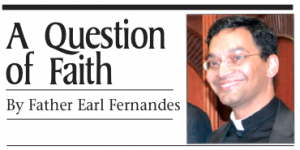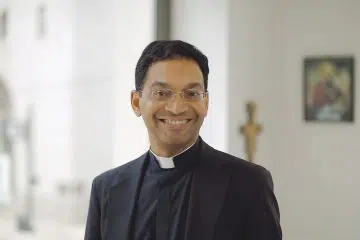Q&A: Is it permissible to dip the Host into the Precious Blood?
 Dear Father: Recently, I have observed a parishioner receiving the Eucharist by dipping the Sacred Host into the Precious Blood and then consuming it. I have always been under the impression that this is not permissible. Can someone receive Communion this way?
Dear Father: Recently, I have observed a parishioner receiving the Eucharist by dipping the Sacred Host into the Precious Blood and then consuming it. I have always been under the impression that this is not permissible. Can someone receive Communion this way?
Dear Reader: Thank you for your question. You are describing something called intinction. Intinction is one means by which people may receive Holy Communion under both species. The General Instruction of the Roman Missal (Third Edition, 2002) makes mention of intinction (n. 287):
If Communion from the chalice is carried out by intinction, each communicant, holding a communion-plate under the chin, approaches the priest, who holds a vessel with the sacred particles, a minister standing at his side and holding the chalice. The priest takes a host, dips it partly into the chalice and, showing it, says, Corpus et Sanguis Christi (The Body and Blood of Christ). The communicant responds, Amen, receives the Sacrament in the mouth from the priest, and then withdraws.
Intinction is quite common in the Christian East, but it is rare in these parts. I have seen Communion distributed by the priest through intinction and use of a spoon in the Eastern churches. Some years ago when I was in Armenia, the Armenian Apostolic Church and Armenian Catholic Church both distributed Communion via intinction. I offered Mass in the Roman Rite, but since everyone was accustomed to receiving via intinction, a religious stood beside me holding the chalice with the Precious Blood into which I dipped the Host and then gave Communion on the tongue to the faithful. If a deacon is present, since he is a proper, ordinary minister of the chalice, it would seem appropriate for him to hold the chalice as the priest intincts.
A later instruction Redemptionis Sacramentum (2004) from the Congregation for Divine Worship also mentions intinction (n. 103):
… If this modality is employed, however, hosts should be used which are neither too thin nor too small, and the communicant should receive the Sacrament from the Priest only on the tongue.
From these two documents, one sees that intinction is permitted; however, the lay faithful do not self-communicate; rather, they receive Communion on the tongue. One also ought to read these instructions in light of the “Norms for the Distribution and Reception of Holy Communion under both Kinds for the United States.” These norms (n. 50) state:
The communicant, including the extraordinary minister, is never allowed to self-communicate, even by means of intinction. Communion under either form, bread or wine, must always be given by an ordinary or extraordinary minister of Holy Communion.
If this is happening in your parish and you have a genuine concern about the practice and reverence for the Eucharist, I suggest that you kindly and politely talk to your pastor about it. It could have been that the woman was ill and thought this was the best way to avoid contaminating the chalice. Perhaps, your pastor (or the communicant) is unaware of the recent instructions; the pastor may be able to delicately and carefully handle the matter. Rather than seeing this simply as a liturgical abuse or viewing these norms as a limitation on the lay faithful, one might think about the value the norms of the church seek to preserve. Consider the words of the 1980 Instruction Inaestimabile Donum:
Communion is a gift of the Lord, given to the faithful through the minister appointed for this purpose. It is not permitted that the faithful should themselves pick up the consecrated bread and the sacred chalice, still less that they should hand them from one to another.
Your question provides us with an opportunity to yet again deepen our appreciation for the gift that the Lord is to us and that we should approach Holy Communion with a posture of humble receptivity, with love and awe.
Father Earl Fernandes is dean of Mount St. Mary’s Seminary and the Athenaeum of Ohio, where he is assistant professor of moral theology. To ask Father Fernandes a question about the faith, send an email to [email protected] or to The Catholic Telegraph, 100 East Eighth Street, Cincinnati, OH 45202.
This A Question of Faith column originally appeared in the May 2014 print edition of The Catholic Telegraph.













